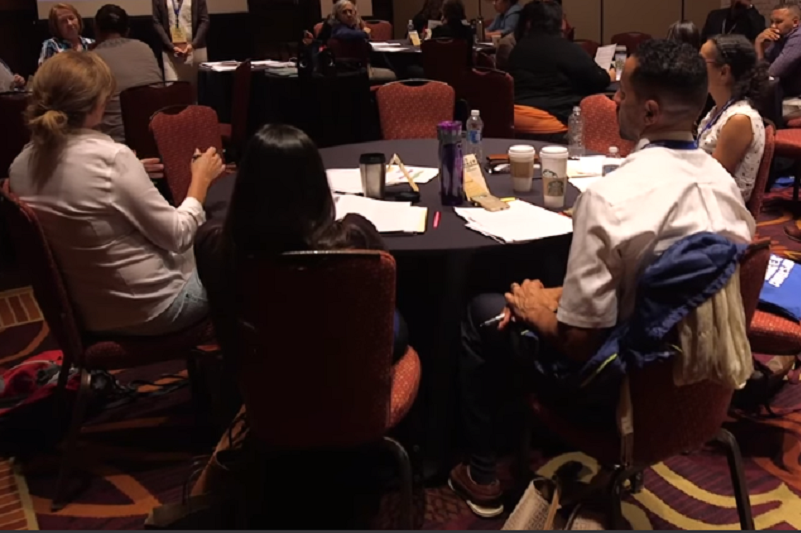The Pacific Education Group (PEG) summit is an annual opportunity for individuals and organizations to engage in deepened conversations about systemic racism and its impact on opportunity and achievement for all people. Utilizing the Courageous Conversation™ Protocol, participants can engage in examining race in their personal, professional and organizational spaces.
This year the summit was held on June 27 and 28 at Odle Middle School in Bellevue. Read reflections of some of the people who attended the event.
Tom Brewer, community outreach director at Bellevue Presbyterian Church, and co-lead of Eastside Pathways Racial Equity Team
Several years ago five community members from Eastside Pathways (EP) accompanied people from Bellevue School District attending a Northwest Regional Summit on racial equity presented by Pacific Educational Group (PEG). We were introduced to the Courageous Conversation protocol for effectively engaging, sustaining and deepening interracial dialogue. Our shared experience prompted EP to form the Racial Equity Team and assure that all the work of the partnership be viewed through a racial equity lens.
Eastside Pathways believes that racial healing and racial equity are essential to accomplishing our mission of supporting children, families, and communities in creating and strengthening the environments in which vulnerable children succeed. The Eastside Pathways Racial Equity Team actively supports efforts to identify and dismantle systemic racial inequities that limit opportunities and hold some children back.
The recent PEG Regional Summit in Bellevue included people from EP partners for the fifth consecutive year. Bringing the Courageous Conversation training into a regional location in successive years affords access to the training for more people who, as colleagues, share the experience and then use the protocol to engage in equity work. Those who can attend multiple years and participate in two or more courses can develop skills enabling them to address racial disparities through safe, authentic, and effective cross-racial dialogue.
Sarah Krawczak, admin and ops coordinator at Eastside Pathways
I had the privilege of participating in the 2-day workshop titled “Beyond Diversity: Introduction to Courageous Conversation & A Foundation for Deinstitutionalizing Racism and Eliminating Racial Achievement Disparities”. In this workshop, community members, leaders, staff from community organizations, and educators gathered to explore the impact of race in society and investigate how institutionalized racism contributes to racial disparities. Specifically, we evaluated how institutionalized racism contributes to academic achievement disparities. During the workshop, we engaged with these topics through thoughtful, compassionate, meaningful reflection and conversation with fellow participants. Using our personal experiences and truths as a starting point, we learned tools and strategies to productively navigate difficult, and often uncomfortable, conversations about race.
During the workshop, I appreciated everyone’s personal openness and willingness to learn and dedicate time to supporting racial equity. Listening to the experiences of my fellow participants and sharing my own was a powerful experience, and I appreciate the space we were given to have these meaningful interactions. As a result of attending Beyond Diversity, I developed a framework for navigating conversations about race in support of racial equity and feel more confident doing so.
I feel that this work is integral to the Eastside Pathways Partnership as we strive to create better outcome for kids on the Eastside. Creating a deeper awareness of race and racism is vital in supporting a racially equitable community and attending the PEG summit gave me the skills necessary to better support this work.
Raymond Chao, development officer at Eastside Pathways
The Beyond Diversity session made several interesting points. Among them, courageous conversations about race is the essential foundation for examining and addressing institutionalized culture and structures that consciously or unconsciously promote racial disparities. The conversations may be uncomfortable, self-serving, and do not provide closure, but if we identify racial equity as the community goal, then they are key to engage, sustain, and deepen intra-racial and inter-racial dialogue about race.

